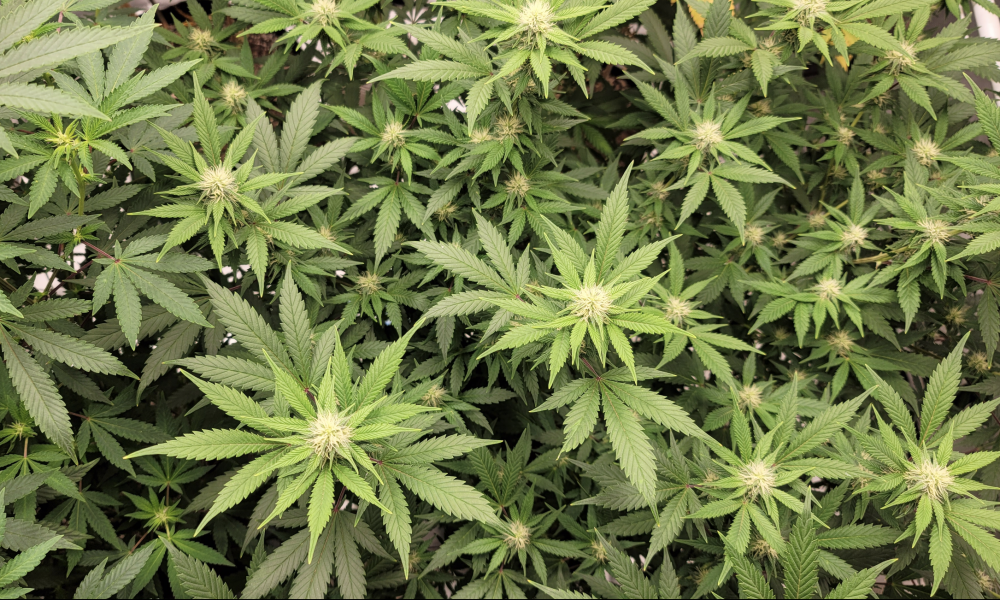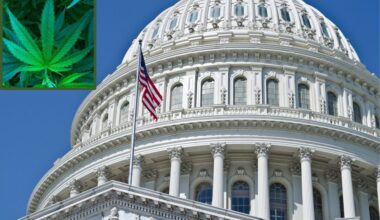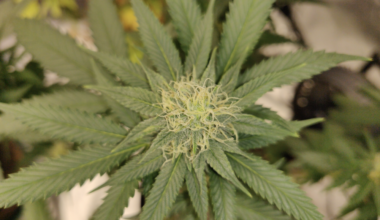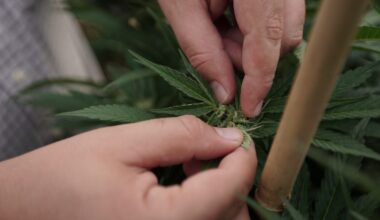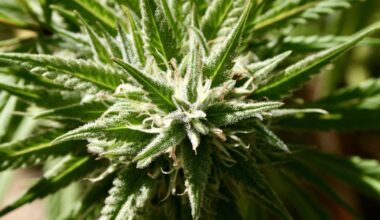California Gov. Gavin Newsom (D) signed 10 marijuana-related bills on Sunday, including measures to set the state up to allow interstate cannabis commerce, provide employment protections for marijuana consumers, facilitate record sealing of prior convictions and prevent localities from blocking medical cannabis deliveries.
The legislature delivered numerous cannabis bills to the governor near the end of the session, and Newsom acted on the majority of them in one fell swoop. He said the reforms were necessary to help fulfill the promises of legalization and continue to address the collateral consequences of prohibition.
“For too many Californians, the promise of cannabis legalization remains out of reach,” Newsom said in a press release. “These measures build on the important strides our state has made toward this goal, but much work remains to build an equitable, safe and sustainable legal cannabis industry. I look forward to partnering with the Legislature and policymakers to fully realize cannabis legalization in communities across California.”
One of the most significant pieces of legislation that the governor signed on Sunday will allow for interstate marijuana commerce from California to and from other legal states, contingent on an official assurance that the activity would not put the state at risk of federal enforcement action.
That bill from Sen. Anna Caballero (D) advanced through the legislature just around the time that, on the other side of the country, New Jersey’s Senate president filed a similar proposal.
Newsom also gave approval to a measure sponsored by Assemblymember Mia Bonta (D) that is meant to enhance justice reform provisions of the state’s marijuana law by mandating the courts to process record sealing and other forms of relief for people with eligible cannabis convictions on their records in a specific timeframe. Courts would have until March 1, 2023 to seal records for qualifying cases that weren’t challenged by July 1, 2020.
Bonta’s husband Rob Bonta, the state attorney general, praised the governor’s signing of the bill in a tweet..
My office has been working diligently to ensure Californians with cannabis convictions are able to make a fresh start.
With the signing of @AsmMiaBonta‘s #AB1706, we are one step closer to making the promise of #AB1793 a reality.
https://t.co/kMrMl3SPa7— Rob Bonta (@AGRobBonta) September 19, 2022
Another notable piece of enacted legislation came from Sen. Scott Wiener (D). The bill prohibits localities from banning medical cannabis deliveries in their areas—a move that advocates say will both improve patient access and help fill voids throughout the state where no cannabis license types have been authorized.
The governor also signed off on a bill from Assemblymember Bill Quirk (D) that will “make it unlawful for an employer to discriminate against a person in hiring, termination, or any term or condition of employment, or otherwise penalize a person” solely because of off-duty marijuana use. It will eliminate employment-based THC testing, with exceptions for certain positions, such as federal employees or those working in construction.
Other measures that Newsom signed include proposals to amend the state’s medical marijuana law to authorize cannabis products for non-human animals and protect veterinarians who issue cannabis recommendations for pets and revise labeling and advertising rules for marijuana vaporizers.
—
Marijuana Moment is tracking more than 1,500 cannabis, psychedelics and drug policy bills in state legislatures and Congress this year. Patreon supporters pledging at least $25/month get access to our interactive maps, charts and hearing calendar so they don’t miss any developments.![]()
Learn more about our marijuana bill tracker and become a supporter on Patreon to get access.
—
While the governor signed cannabis numerous bills all at once, he already taken action on several other marijuana measures earlier this month.
For example, activists cheered his recent move to sign a bill that includes provisions mandating that social workers who are called to investigate child welfare handle parental marijuana use in the same way that they do for alcohol.
Newsom also signed two additional marijuana bills this month, including one that provides protections for medical cannabis patients against discrimination in healthcare. The other legislation amends an existing law that permits registered patients to use medical marijuana products at hospitals.
The governor has a long record of supporting marijuana reform and backing the state’s market, so he’s generally been expected to sign these measures. But despite his record, he recently vetoed a key piece of drug policy reform legislation from Wiener that would have authorized a safe drug consumption site pilot program in the state—a move that’s prompted widespread criticism from the harm reduction community.
San Francisco officials have since signaled that they’re prepared to defy the governor and launch an overdose prevention program regardless of the veto.
In another disappointment for reform advocates, a separate Wiener bill that would have legalized possession of limited amounts of certain psychedelics was recently pulled by the sponsor after its main provisions were gutted, leaving just a study component that advocates say is unnecessary given the existing body of scientific literature on the subject.
Here’s a summary of all of the marijuana bills that Newsom signed on Sunday:
SB 1326: Caballero’s measure would set the stage to allow for interstate marijuana commerce from California to and from other legal states, contingent on an official assurance that the activity would not put the state at risk of federal enforcement action.
AB 2188: Quirk’s bill would “make it unlawful for an employer to discriminate against a person in hiring, termination, or any term or condition of employment, or otherwise penalize a person” solely because of off-duty marijuana use. It would eliminate employment-based THC testing, with exceptions for certain positions, such as federal employees or those working in construction.
SB 1186: The bill from Wiener would “prohibit a local jurisdiction from adopting or enforcing any regulation that prohibits the retail sale by delivery within the local jurisdiction of medicinal cannabis to medicinal cannabis patients or their primary caregivers by medicinal cannabis businesses.”
AB 1706: Bonta’s legislation is meant to enhance justice reform provisions of the state’s marijuana law by mandating the courts to process record sealing and other forms of relief for people with eligible cannabis convictions on their records in a specific timeframe. Courts would have until March 1, 2023 to seal records for qualifying cases that weren’t challenged by July 1, 2020.
AB 1885: The bill from Assemblymember Ash Kalra (D) would prohibit regulators from penalizing licensed veterinarians who recommend medical cannabis for animals and revise state law to include definitions for marijuana products intended for animal consumption. The Veterinary Medical Board would also be required to create guidelines for veterinarian cannabis recommendations.
AB 2568: Sponsored by Assemblymember Ken Cooley (D), the bill would “provide it is not a crime solely for individuals and firms to provide insurance and related services to persons licensed to engage in commercial cannabis activity,” according to a summary.
AB 1894: Assemblymember Luz Rivas’s (D) bill would add advertising and labeling requirements for cannabis vaporizer products, stipulating that they should be properly disposed and would constitute hazard waste if thrown away improperly.
AB 2210: Another bill from Quirk would prohibit state marijuana regulators from “denying an application for a state temporary event license solely on the basis that there is a license issued pursuant to the Alcoholic Beverage Control Act for the proposed premises of the event.”
AB 2925: This measure from Jim Cooper (D) would mandate that the State Department of Health Care Services submit reports to the legislature, starting no later than July 10, 2023, that accounts for cannabis tax revenue that has been distributed to the Youth Education, Prevention, Early Intervention and Treatment Account, as required under the state’s marijuana law.
AB 1646: This bill, sponsored by Assemblyman Phillip Chen (R), would “authorize cannabis beverages to be packaged in containers of any material that are clear or any color.”
There is at least one remaining marijuana bill that the governor has yet to act on:
SB 1496 This bill that came out of the Committee on Governance and Finance would make a series of changes to the state’s cannabis tax policy, including by authorizing regulators to extend the deadline for tax payments by cannabis businesses located in areas affected by an emergency proclamation by the governor.
Here’s an overview of other recent drug policy developments in California:
In July, California officials awarded more than $1.7 million in grants help promote sustainable marijuana cultivation practices and assist growers with obtaining their annual licenses. A total of $6 million will be allotted through the program, which was first announced in August 2021 and will remain open for applications through April 2023.
Regulators also recently announced that they are soliciting input on proposed rules to standardize cannabis testing methods in the state—an effort that they hope will stop marijuana businesses from “laboratory shopping” to find facilities that are more likely to show higher THC concentrations that they can then boast for their products.
Meanwhile, California officials are distributing another round of community reinvestment grants totaling $35.5 million with tax revenue generated from recreational marijuana sales.
The Governor’s Office of Business and Economic Development (GO-Biz) announced in July that they’ve awarded 78 grants to organizations throughout the state that will support economic and social development in communities disproportionately impacted by the war on drugs.
The amount of funding and number of recipients increased from last year’s levels, when the state awarded about $29 million in grants to 58 nonprofit organizations through the CalCRG program.
California has taken in nearly $4 billion in marijuana tax revenue since the state’s adult-use market launched in 2018, the Department of Tax and Fee Administration (CDTFA) reported in July. And for the first quarter of 2022, the state saw about $294 million in cannabis revenue generated from the excise, cultivation and sales tax on marijuana.
The state collected about $817 million in adult-use marijuana tax revenue during the last fiscal year. That represented 55 percent more cannabis earnings for state coffers than was generated in the 2020-2021 period.
California officials also announced in January that the state had awarded $100 million in funding to help develop local marijuana markets, in part by getting cannabis businesses fully licensed.
Photo courtesy of Mike Latimer.
Medical Disclaimer:
The information provided in these blog posts is intended for general informational and educational purposes only. It is not a substitute for professional medical advice, diagnosis, or treatment. Always seek the advice of your physician or other qualified healthcare provider with any questions you may have regarding a medical condition. The use of any information provided in these blog posts is solely at your own risk. The authors and the website do not recommend or endorse any specific products, treatments, or procedures mentioned. Reliance on any information in these blog posts is solely at your own discretion.
